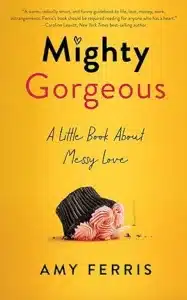For weeks I sat on the edge of the pool, dangling my feet in the overchlorinated water. I watched as screaming kids executed cannonballs and underwater handstands. My body ached with envy, but I couldn’t bring myself to jump in. At seven-years old, I felt it was already too late for me to learn to swim. Seven-year-olds, at least the strong, brave, competent ones, had been swimming for years. My shame kept me firmly cemented on the ledge.
Each day, during those weeks, Dad would spread out a towel on the hot concrete and sit down next to me. He would drape his muscular arm around my bony shoulder and whisper, “Are you ready?” Every day I would shake my head no. Until one, particularly humid day, for some reason, I reluctantly nodded my head, yes. That is when dad scooped me up and walked us slowly down the wide steps with the long silver banister into the shallow end of the pool at the Dolphin Swim Club. I wrapped my goose-pimpled arms tightly around his neck and tied my skinny legs to his torso.
“We are going to start by learning to float on your back,” he said with a gentle smile. “If you ever get into trouble or you get too tired you can always just flip over and float.”
Flip over and float. He made it sound so easy. But, stubborn with fear, I refused to let go.
“It’s okay, today we are just floating,” he whispered in my ear as he carried me through the water.
I clung tighter.
Dad lumbered around the pool with me glued to the trunk of his body for a long while. He bobbed up and down, back, and forth. When I finally relaxed my shoulders and loosened my grip ever so slightly, he cupped the base of my head in one hand and gently lowered it into the cool water. He placed his other hand firmly on the small of my back.
“Now, just lie back,” he said calmly. “That’s all you have to do. That’s it, there you go, you are floating. That is all you have to do.”
Dad’s voice was faint but soothing through the water. I closed my eyes and felt the sun on my checks. My thin wisps of brown hair fanned out around my face.
“Ahhhhh, what a macheyeh,” he said, repeating the Yiddish word for joy.
I could feel his smile through his words and instinctively knew its meaning. He didn’t do that thing that many parents do– unexpectedly letting you go and making a big show of how you are doing it all by yourself. Instead, dad kept a feather touch on my lower back just enough pressure so I knew he was still with me if I needed him.
Just when I felt like I could float like that forever, a sudden splash of water smacked at my face. I panicked and flailed my arms and legs at the same time. I felt my body slip away from dad’s hand and start to sink. The water splashed over my mouth and nose. Dad scooped me back up in an instant. But those seconds left me sobbing and gasping for air.
“Shhh, shhh, shhhh,” Dad said caressing my head, “you are okay, Peanut. That little boy over there just jumped into the water and splashed you.”
He pointed to a boy with white, blond curls and a mischievous grin. I glared at the boy still sniffling.
“Don’t worry about him,” Dad said, “all you have to do is keep floating and you will be safe.”
I buried my face in the crook of dad’s neck for a long while. He didn’t take me out of the pool. He didn’t suggest we try again. He just kept bobbing along with me until I calmed down. Then I said, “Okay, let’s try again.”
Dad smiled. He looked proud. “Okay. Remember, no matter what happens just keep floating –don’t worry about what is behind you or in front of you. Just float. I will be here the whole time.”
Within weeks I was doing freestyle, cannonballing and even working on my underwater handstand, while Dad watched from the edge of the pool—there if I needed him.
Most importantly, that summer I learned to float.
***
Thirty summers later after dad taught me to float, I was living a life I convinced myself was perfect. I was married to a man with whom I was deeply in love. I had a beautiful baby boy and a job as a lawyer in one of Philadelphia’s biggest law firms. And then within the course of three months, I had stepped on a trifecta of landmines that left me flailing and gasping for air. My marriage began to unravel. I suffered a health crisis that I could have never seen coming. And I experienced a professional failure that left me wondering whether I chose the right career path.
During those sticky months, I somehow managed to get through my workdays and complete the maternal checklist of dinner, bath, book, and bedtime. Then I would collapse into grief—lying on my couch, scrolling mindlessly through Facebook, crying, and eating the most comforting food Grubhub had to offer. I wasn’t sleeping, my eyes were perpetually swollen, and despite the Grubhub, I was somehow losing weight. I felt myself being pulled into a place I had never been before. The identity I had spent so much of my life erecting had crumbled in the span of three months. I didn’t know who I would be without the perfect marriage, the perfect job, and a healthy functioning body.
I had always learned that Jews don’t kneel, but one sleepless night in August I got up and for some reason found myself on my knees at the edge of my bed with my hands cupped in front of me, the way I had seen little kids pray on television.
“Please,” I whispered to a God I had never spoken to before, “please take this all from me. Please help me.”
I stayed there on my knees for a long while. I was waiting for an answer, a sign, some instructions about how to move forward. There was no answer, no sign, no instructions. God said nothing. Still, I felt calmer for having spoken the words, lighter somehow. I got back in bed and just kept whispering to myself, “you are ok, you are ok, you are ok.”
Kneeling before my bed and asking for God’s help became my ritual that summer. The words “you are ok” became my refrain. I repeated them to myself each time my thoughts pulled me into regret, anger, shame or overwhelm. I repeated them when I felt rage rise in my chest and when I felt terrified of what was to come.
By September, I was sleeping better, crying less, reading more. I was singing to my baby boy again. And at some point, that fall, I realized I was floating.
*This essay was originally published online at Philadelphia Stories.
Tammi Markowitz Inscho is a reformed trial lawyer turned writer. Tammi’s personal essays have been featured here at The Manifest-Station and in The Philadelphia Inquirer. Tammi is currently hard at work on her first novel. She also leads creative writing workshops for youth and teens in the Philadelphia area. She lives in Center City Philadelphia with her husband and young son.
***
Wondering what to read next?
We are huge fans of messy stories. Uncomfortable stories. Stories of imperfection.
Life isn’t easy and in this gem of a book, Amy Ferris takes us on a tender and fierce journey with this collection of stories that gives us real answers to tough questions. This is a fantastic follow-up to Ferris’ Marrying George Clooney: Confessions of a Midlife Crisis and we are all in!
***





